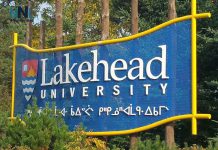Thunder Bay – TECH – Two Lakehead University professors are each receiving significant research funding from the Social Sciences and Humanities Research Council of Canada. In total, the amount represents more that $470,000 of funding
Dr. Jian Deng from Civil Engineering is receiving a $237,970 grant under SSHRC’s New Frontiers in Research Fund: special call on innovative approaches to research in the pandemic context.
Over one year, Dr. Deng and his team will explore new approaches in probabilistic slope stability analysis, which is how a civil engineer examines if the angle of a slope in a roadway, bridge or dam will result in that structure failing.
During the COVID-19 pandemic, traffic volumes to collect soil sampling have been cut down by road closures. The access to laboratories, libraries, and archives has also been limited to very few personnel and very short periods of time.
“The objective of this proposal is to explore novel approaches in probabilistic slope stability analysis and design under small, censored samples due to the pandemic,” Dr. Deng said.
This research will contribute significantly to the advancement of knowledge and technologies associated with probabilistic slope analysis and design. Enhanced understanding of the slope failure mechanism will inform protocols and measures, by proper soil stabilization measures, to avoid slope disasters.
This research will benefit the construction and excavation industries in Canada.
Dr. Nicholas Ravanelli from Kinesiology is also receiving a one-year grant under SSHRC’s New Frontiers in Research Fund: special call on innovative approaches to research in the pandemic context – for $237,730.
Dr. Ravanelli and his team will examine the way vulnerable people behave and their physiological responses to heat waves.
“The rise in mortality during heat waves primarily occurs at-home rather than in-hospital or medically supervised settings,” Dr. Ravanelli said.
“This highlights the urgent need to evaluate how human behaviour and physiological responses to heat stress in personal dwellings increases the risk for heat-related complications.”
Advancements in wearable sensors, web applications, and internet-connected devices offer a unique opportunity to transform traditional data collection equipment to monitor the indoor and outdoor environmental conditions along with each person’s behavioural and physiological responses in real-time during heat waves.
The transition from laboratory to an at-home data collection approach is timely – since the COVID-19 pandemic has resulted in limitations to patient-engaged research.
Dr. Ravanelli said these at-home environmental and health monitoring solutions may identify the primary factors influencing heat-related complications in vulnerable populations and provide greater telemedicine diagnostic precision for individuals who lack immediate access to health-care services.
“This could potentially enable early detection for heat-related complications and personalize resilience strategies during heat waves,” he said.
Dr. Andrew P. Dean, Lakehead’s Vice-President, Research and Innovation, congratulated both researchers and thanked SSHRC for this valuable funding.
“Research has continued during the pandemic and new avenues for research projects have emerged,” Dr. Dean said.
“Both of these projects are timely and very applied as we continue to see how research helps society to deal with the direct and indirect effects of the pandemic.”
Source: Lakehead University





